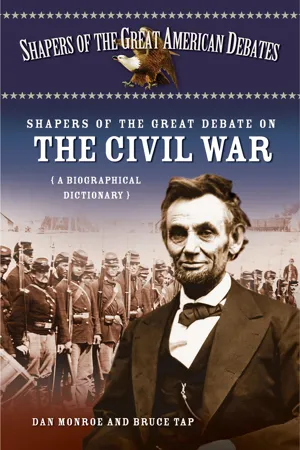
Shapers of the Great Debate on the Civil War
A Biographical Dictionary
- 436 pages
- English
- PDF
- Available on iOS & Android
About this book
With the conclusion of the Mexican War in 1848, the United States seemed poised to fulfill the manifest destiny that was on the lips of journalists and politicians. Yet, even before the war was over, tensions over the issue of slavery erupted. Slavery symbolized the social, cultural, constitutional, and economic differences that were dividing the North and South. Through four years of bloody civil war and the loss of over 600, 000 lives, the American republic decided the fate of slavery, asserted the supremacy of the federal government over state authority, and began to grapple with the difficult issues of reconstruction. This work provides substantial biographical entries of 20 individuals who shaped and defined the debates during the Civil War period. Political and military figures, such as Abraham Lincoln and Robert E. Lee, writers such as Harriet Beecher Stowe, and abolitionist reformers, such as Frederick Douglass and George Fitzhugh, are included. With the conclusion of the Mexican War in 1848, the United States seemed poised to fulfill the manifest destiny that was on the lips of journalists and politicians. Yet, even before the war was over, tensions over the issue of slavery erupted. Slavery symbolized the social, cultural, constitutional, and economic differences that were dividing the North and South. Through four years of bloody civil war and the loss of over 600, 000 lives, the American republic decided the fate of slavery, asserted the supremacy of the federal government over state authority, and began to grapple with the difficult issues of reconstruction. This work provides substantial biographical entries of 20 individuals who shaped and defined the debates during the Civil War period. Political and military figures, such as Abraham Lincoln and Robert E. Lee, writers such as Harriet Beecher Stowe, and abolitionist reformers, such as Frederick Douglass and George Fitzhugh, are included. Each biography provides a concise account of the subject's life, followed by an analysis of the figure's role and contribution to the central issues of the day, and concludes with a bibliography of secondary and primary sources available to students. An appendix of over 180 additional biographies highlights the lives of others who played a role in the debates of the Civil War.
Frequently asked questions
- Essential is ideal for learners and professionals who enjoy exploring a wide range of subjects. Access the Essential Library with 800,000+ trusted titles and best-sellers across business, personal growth, and the humanities. Includes unlimited reading time and Standard Read Aloud voice.
- Complete: Perfect for advanced learners and researchers needing full, unrestricted access. Unlock 1.4M+ books across hundreds of subjects, including academic and specialized titles. The Complete Plan also includes advanced features like Premium Read Aloud and Research Assistant.
Please note we cannot support devices running on iOS 13 and Android 7 or earlier. Learn more about using the app.
Information
Table of contents
- CONTENTS
- SERIES FOREWORD
- ACKNOWLEDGMENTS
- INTRODUCTION: WHAT WERE THE GREAT DEBATES?
- JOHN BROWN (1800–1859)
- JAMES BUCHANAN (1791–1868)
- SALMON CHASE (1808–1873)
- JEFFERSON DAVIS (1808–1889)
- STEPHEN A. DOUGLAS (1813–1861)
- FREDERICK DOUGLASS (1817–1895)
- GEORGE FITZHUGH (1806–1881)
- HORACE GREELEY (1811–1872)
- ANDREW JOHNSON (1808–1875)
- ROBERT E. LEE (1807–1870)
- ABRAHAM LINCOLN (1809–1865)
- GEORGE BRINTON McCLELLAN (1826–1885)
- WILLIAM H. SEWARD (1801–1872)
- ALEXANDER H. STEPHENS (1812–1883)
- THADDEUS STEVENS (1792–1868)
- HARRIET BEECHER STOWE (1811–1896)
- CHARLES SUMNER (1811–1874)
- CLEMENT LAIRD VALLANDIGHAM (1820–1871)
- WILLIAM LOWNDES YANCEY (1814–1863)
- APPENDIX: BRIEF BIOGRAPHIES
- INDEX